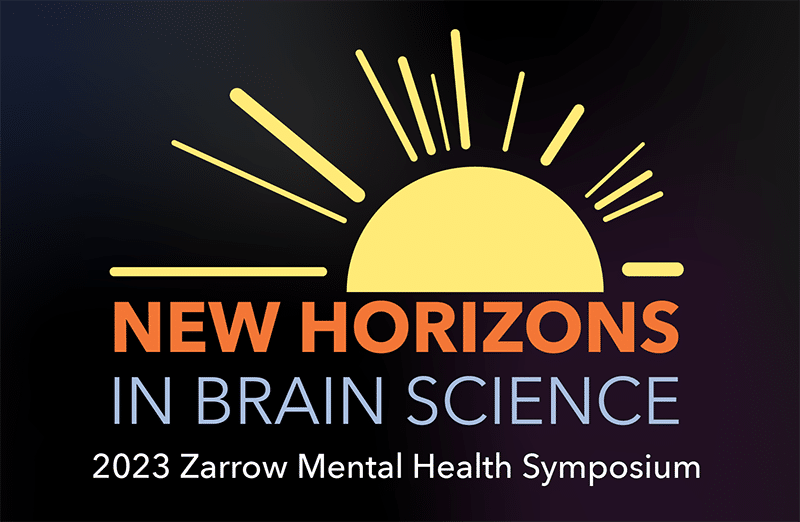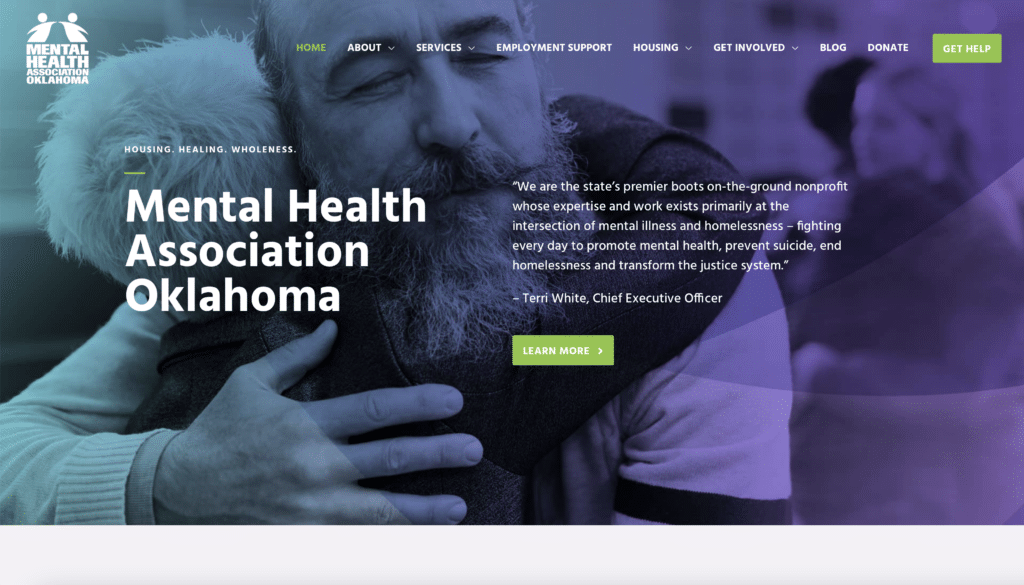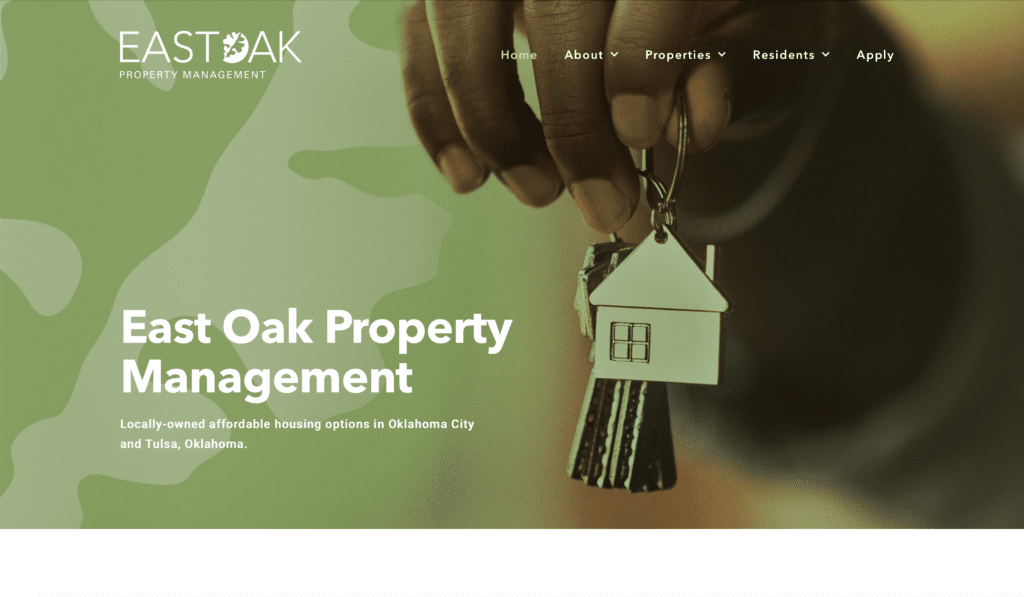2022 IMPACT
REPORT
HOUSING. HEALING. WHOLENESS.

A NOTE FROM OUR CHIEF EXECUTIVE OFFICER
Housing. Healing. Wholeness.
Housing changes the trajectory of life for people experiencing homelessness. It leads to healing and ultimately to wholeness.
Most of us rarely give thought to the simple importance of having an address.
It’s where we get our mail. It’s where we sleep and cook. It’s where we shower and do our laundry. It’s where we entertain family and friends. It’s where we celebrate and mourn.
It is home.
It all goes away if you find yourself living on the streets. Life becomes survival. All energy is consumed by two thoughts: Food and Shelter.
Where will I get my next meal? Where will I get out of the cold… or the heat… or the rain…
Here at Mental Health Association Oklahoma we know the importance of having an address. We hit the streets everyday to build trust with individuals experiencing homelessness. We know we must gain trust before we can cross the “bridge” together to: Housing. Healing. Wholeness.
Our street outreach and street medicine teams work diligently to connect those in need with the wealth of community services on the other side of the bridge.
The path from homelessness to housing might start with a smile, a bottle of water or a pair of socks. It might start at one of our drop-in centers where individuals can regroup and gather needed documents like an ID, Veteran documents or birth certificate.
The path might start when you hop on the A Better Way van for the dignity of work. And ultimately a new job.
Together, with our supporters, we walk the path from homelessness to housing alongside those with a heavy load because we know that having an address can solve a multitude of problems.
– Terri White, Chief Executive Officer
OUR LEADERSHIP
With tenacious leadership, our Chiefs ignite a powerful response to the most difficult challenges endured by our state’s citizens in need. They, along with nearly 200 MHAOK employees, comprise the state’s premier boots-on-the-ground nonprofit whose expertise and work exists primarily at the intersection of mental illness and homelessness.
Because of your generous support, they are able to facilitate the life-saving services our team provides to more than 30,000 Oklahomans each year – navigating the rapidly growing need for mental health support and fighting to end homelessness.
Mental Health Association Oklahoma programs are innovative, evidence-based, and most importantly, they’re effective. They include housing (committed to the Housing First model), street outreach, street medicine, peer-to-peer recovery services, employment services, suicide prevention, Mental Health Assistance Center, criminal justice advocacy, youth mental health and support groups.
We maintain a spotlight on the need for affordable housing, amplifying the voices of those with lived experience. As we continue to expand our safe and affordable housing footprint through rehabilitation projects like the Taylor Ridge Apartments in Oklahoma City, we fight with urgency to champion for those who need our help. MHAOK’s homelessness advocacy efforts span from local to state to national levels as we work to shatter stigma, eliminate discrimination and create effective solutions to ensure that every Oklahoman is safe, healthy and has the opportunity to thrive.

Youth Mental Health
We address homelessness through Housing First, a national evidence-based model that recognizes that individuals can best address personal challenges and pursue self-sustainability when the safety, security and stability of a home have been established.
- We moved 240 individuals and families into safe and affordable housing.
- In 2022, MHAOK had over 1,500 units of affordable and supportive housing in Tulsa and Oklahoma City.
- In 2022, approximately 90% of our residents remained in housing after one year.
- We moved 240 individuals and families into safe and affordable housing.
- In 2022, MHAOK had over 1,500 units of affordable and supportive housing in Tulsa and Oklahoma City.
- In 2022, approximately 90% of our residents remained in housing after one year.
LARA GETS HOUSED AFTER YEARS OF LIVING ON THE STREETS
It was mid-November 2022 when Lara first contacted Mental Health Association Oklahoma through our website. The air was crisp and after several winters living on the streets, she resolved to reroute her life to one that was safer, warmer, healthier – one that embodied living, rather than just surviving. She came to us with clinically-diagnosed mental health disorders and challenges in managing her care.
As a past high school valedictorian, she is bright and determined, a science lover and adventurer. She was a young woman with big plans, but she was also a young woman with too few resources to manage her mental health. An unexpected change in her family dynamic exacerbated her struggles, and by the time she connected with us, she was in dire straits – desperate for healthcare, food security and a safe, stable place to call home.
Our team immediately got to work, completing her intake forms and getting her housing secured. We are thrilled to report that Lara got the keys to her new apartment in February and we are currently assisting her through our Supportive Employment program. Additionally, we are working with legal aid for Lara’s Supplemental Security Income (SSI) and have connected her with behavioral health treatment. She is actively working toward recovery, and is now a beloved regular volunteer at a local nonprofit.
Street Outreach
Our street outreach teams regularly visit vulnerable individuals who are inhabiting encampments, bridges, street corners and other places not fit for human habitation with a goal of providing housing and wrap-around case management to increase community reintegration.
In 2022, OKC Street Outreach
- connected with 1,332 individuals
- distributed 1,440 care packs
- housed 120 participants
In 2022, Tulsa Street Outreach
- connected with 2,955 individuals
- distributed 8,820 care packs
- housed 96 participants
In 2022, OKC Street Outreach
- connected with 1,332 individuals
- distributed 1,440 care packs
- housed 120 participants
In 2022, Tulsa Street Outreach
- connected with 2,955 individuals
- distributed 8,820 care packs
- housed 96 participants
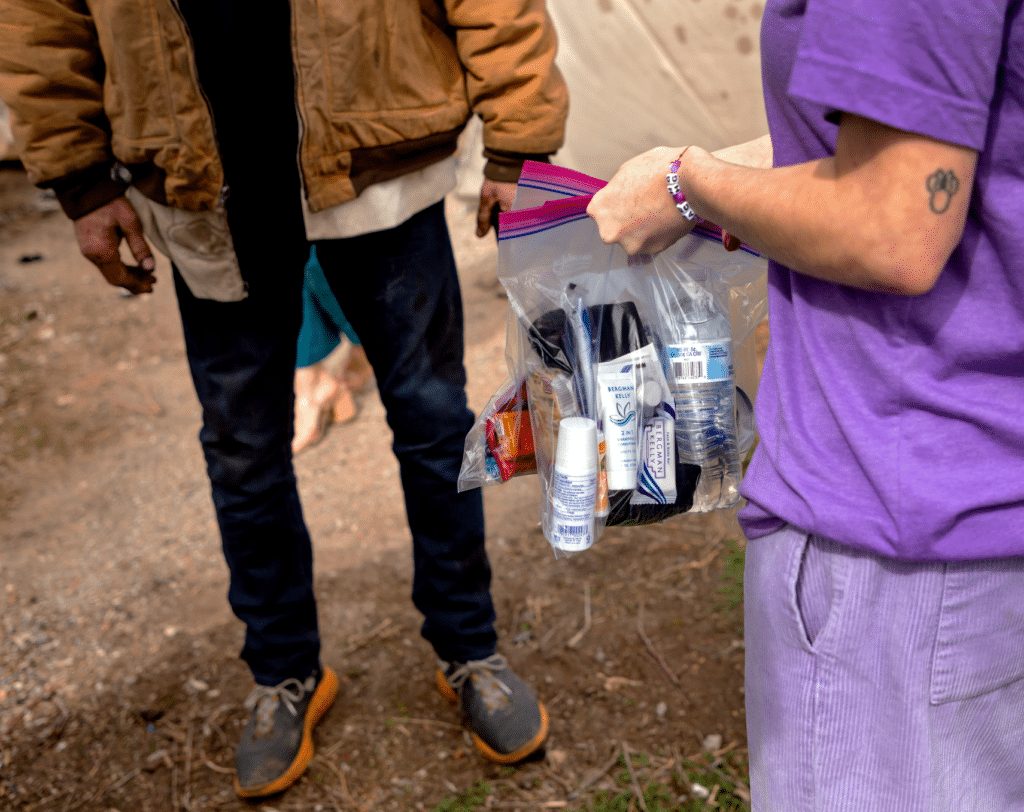
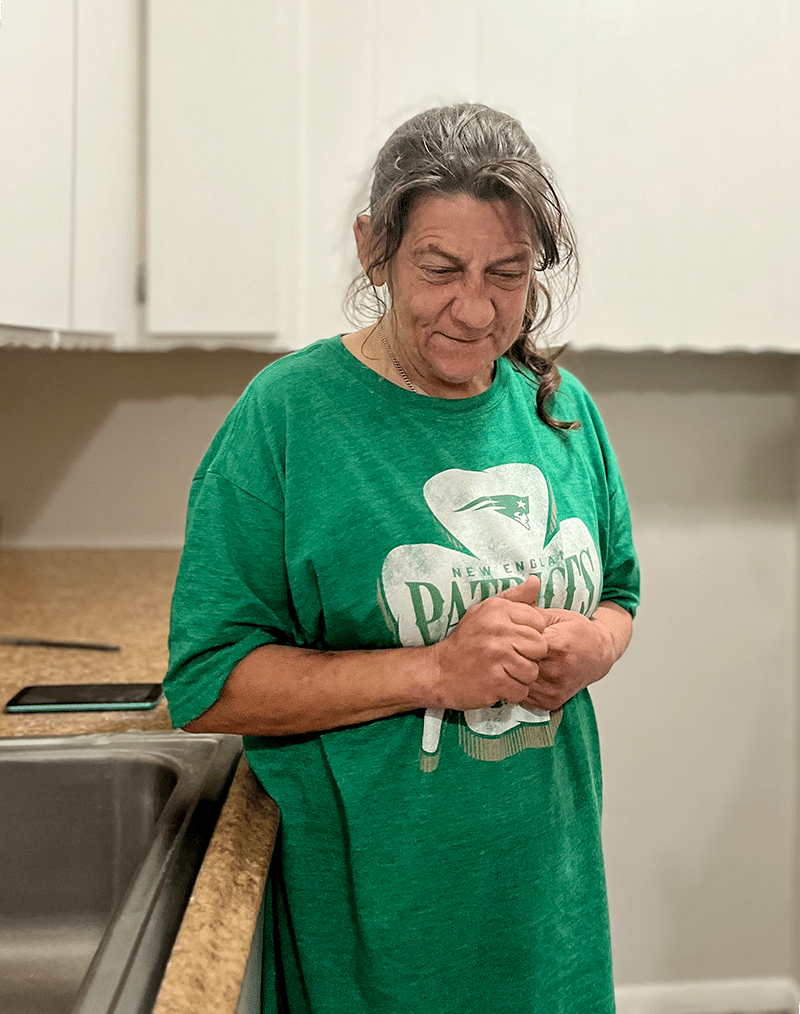
Peer-Run Drop-In Centers
MHAOK has the state’s only two peer-run drop-in centers, where our Peer Recovery Support Specialists assist individuals experiencing homelessness with obtaining vital documents, connection to mental health services, laundry, food, phone charging, clothing, socialization and housing opportunities.
In 2022, Lottie House
- answered 7,984 knocks on the door
- provided 24,089 resources such as clothing, bus passes and hygiene kits
In 2022, Denver House
- answered 13,120 knocks on the door
- provided 34,706 resources
In 2022, Lottie House
- answered 7,984 knocks on the door
- provided 24,089 resources such as clothing, bus passes and hygiene kits
In 2022, Denver House
- answered 13,120 knocks on the door
- provided 34,706 resources
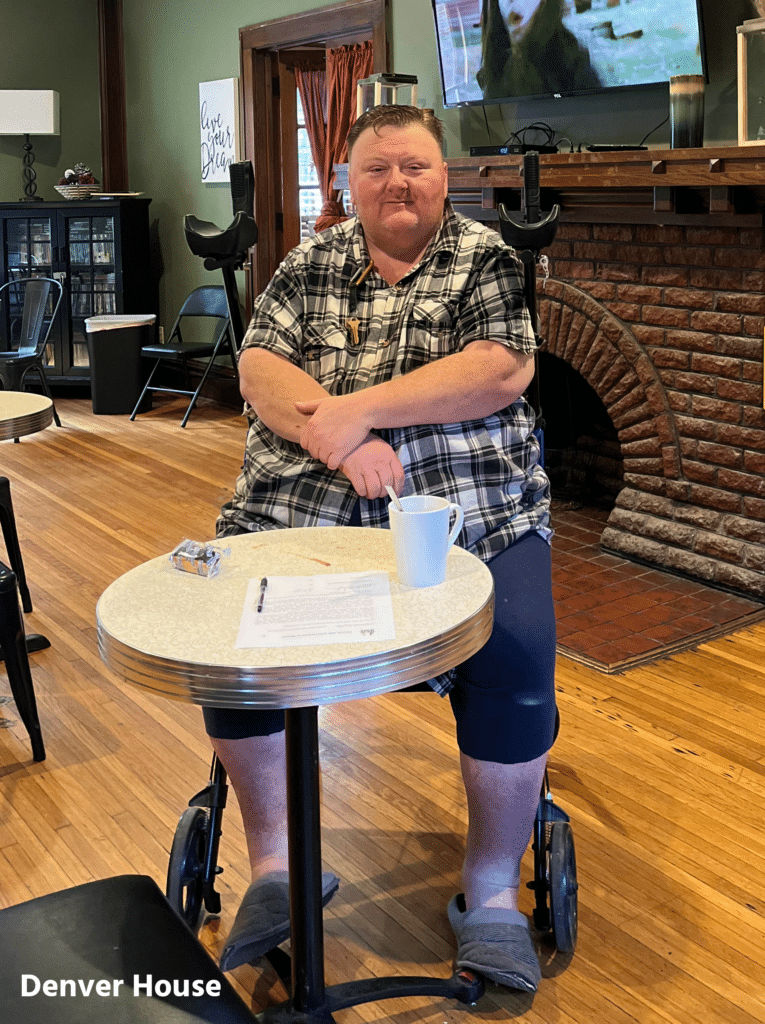
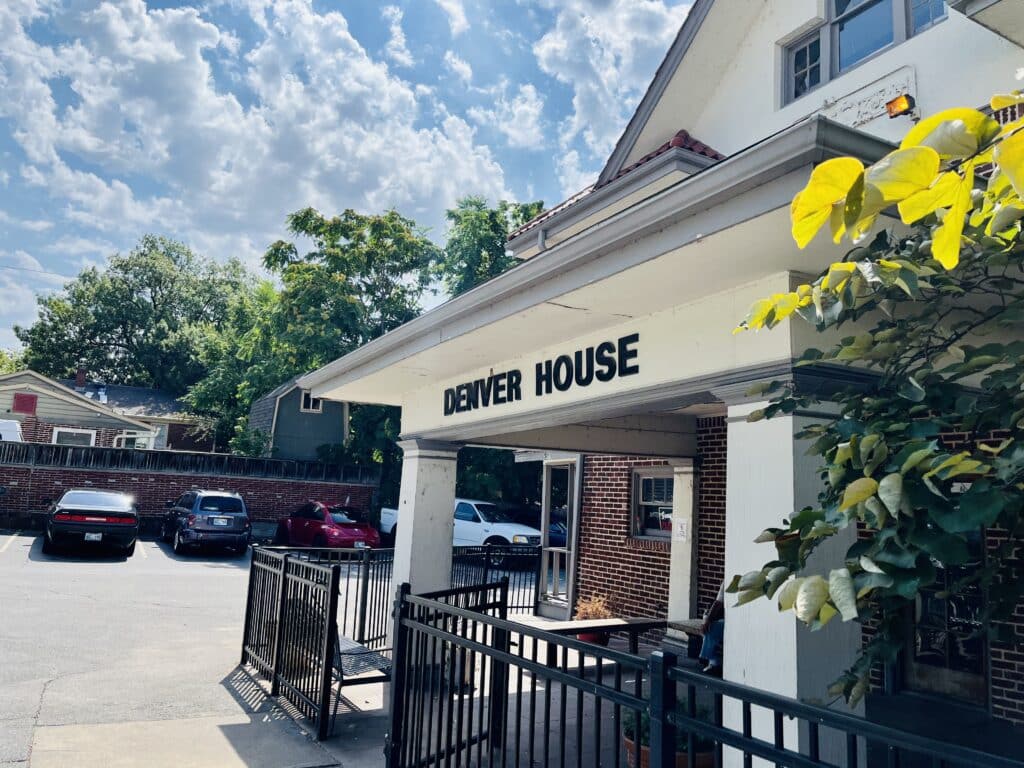
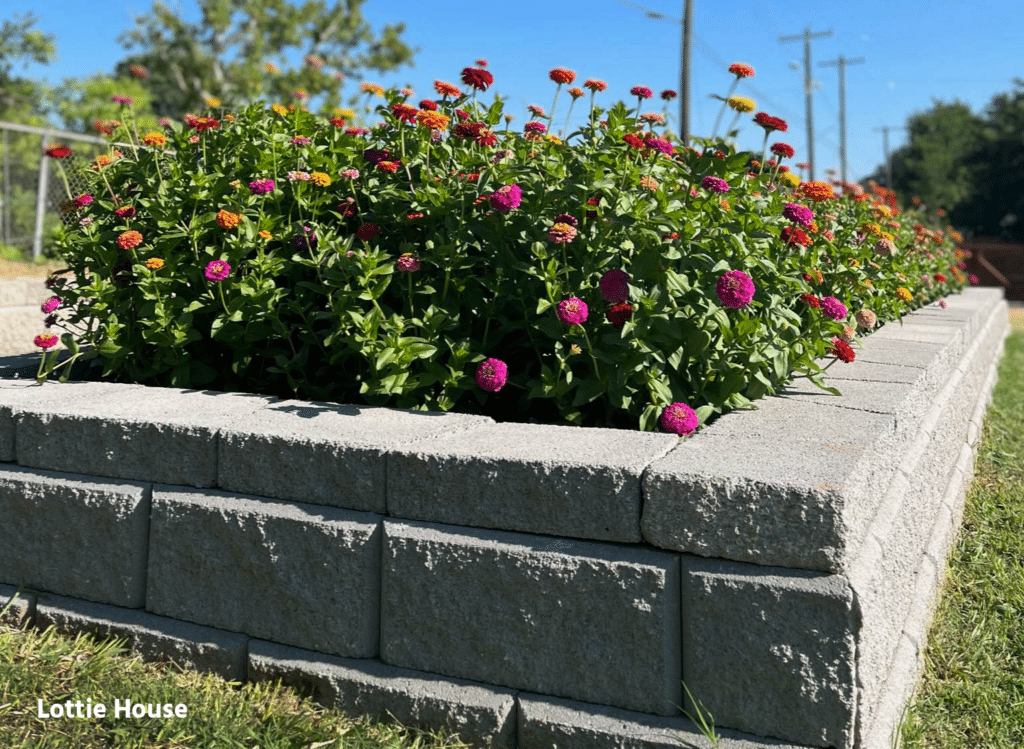
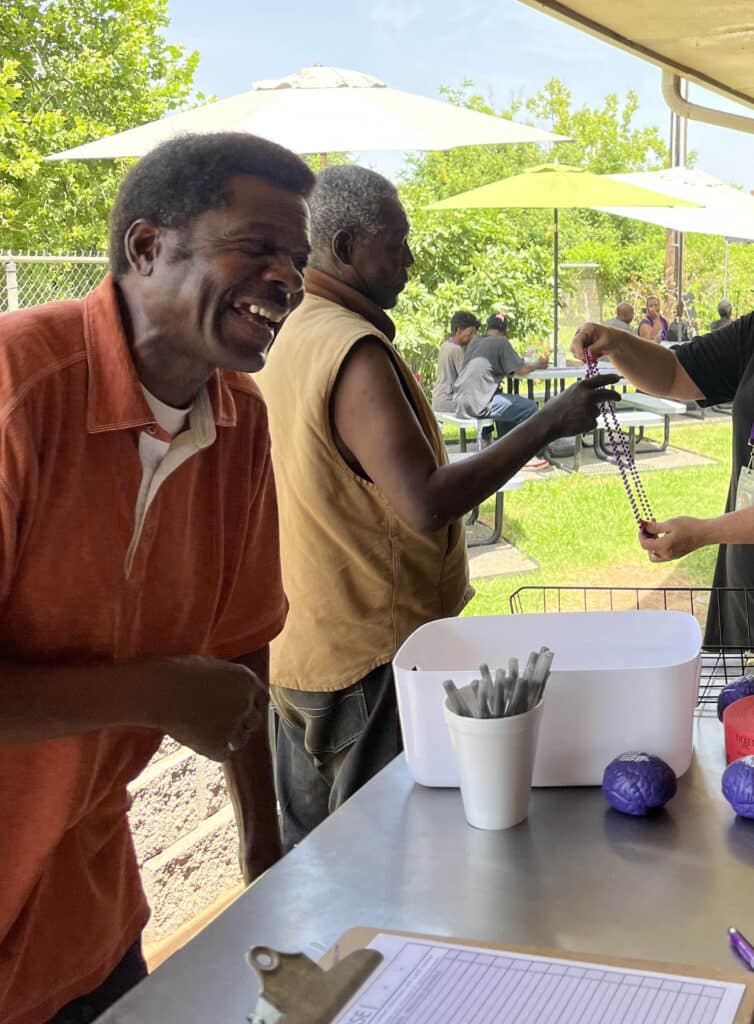
Intensive Outreach and Navigation (ION)
The ION team serves individuals who are experiencing homelessness and serious mental illness who have frequently utilized OKC crisis centers and psychiatric hospital beds.
ION includes immediate access to housing at apartment complexes throughout OKC, along with intensive wrap-around case management services to assist in the journey to self-sustainability.
In 2022, there was a 90% reduction in arrests, an 86% reduction of recidivism in crisis center/hospital stays and an 88% community reintegration and self-sufficiency success rate.
Intensive Outreach and Navigation (ION)
The ION team serves individuals who are experiencing homelessness and serious mental illness who have frequently utilized OKC crisis centers and psychiatric hospital beds.
ION includes immediate access to housing at apartment complexes throughout OKC, along with intensive wrap-around case management services to assist in the journey to self-sustainability.
In 2022, there was a 90% reduction in arrests, an 86% reduction of recidivism in crisis center/hospital stays and an 88% community reintegration and self-sufficiency success rate.
Housing to Hope Youth Program (HHYP)
HHYP provides transitional housing and case management services to young adults, ages 18-24, who are experiencing homelessness. These individuals have been in the child welfare system, experienced justice involvement or survived human trafficking.
In 2022, we proudly served more than 25 participants through our HHYP program.
- obtained benefits for 10
- obtained state issued IDs and social security cards for six
- assisted three with earning their high school diploma or equivalency
- Four of our participants found employment
- Seven were actively participating in mental health services
Housing to Hope Youth Program (HHYP)
HHYP provides transitional housing and case management services to young adults, ages 18-24, who are experiencing homelessness. These individuals have been in the child welfare system, experienced justice involvement or survived human trafficking.
In 2022, we proudly served more than 25 participants through our HHYP program.
- obtained benefits for 10
- obtained state issued IDs and social security cards for six
- assisted three with earning their high school diploma or equivalency
- Four of our participants found employment
- Seven were actively participating in mental health services
A Better Way
MHAOK has partnered with the City of Tulsa and the City of Oklahoma City to bring an alternative to panhandling that pay’s a day’s wages for a day’s work beautifying our communities. In our “A Better Way” program, our case managers connect with participants during lunch to discuss housing, mental health services and permanent employment services. Lunch is provided by our partners: T-Town Tacos in Tulsa and The Regional Food Bank of Oklahoma in OKC. A Better Way works in tandem with our other in-house employment services to help move those in need toward self-sufficiency.
A Better Way
MHAOK has partnered with the City of Tulsa and the City of Oklahoma City to bring an alternative to panhandling that pay’s a day’s wages for a day’s work beautifying our communities. In our “A Better Way” program, our case managers connect with participants during lunch to discuss housing, mental health services and permanent employment services. Lunch is provided by our partners: T-Town Tacos in Tulsa and The Regional Food Bank of Oklahoma in OKC. A Better Way works in tandem with our other in-house employment services to help move those in need toward self-sufficiency.
In 2022, Tulsa A Better Way
- picked up 834 individuals in the van
- celebrated 41 permanent job placements
- connected 128 to mental health services
- connected 110 to benefits
In 2022, OKC A Better Way
- picked up 867 individuals in the van
- celebrated 35 permanent job placements
- moved 36 participants into supportive housing
- connected 145 to mental health services
- connected 217 to benefits
In 2022, Tulsa A Better Way
- picked up 834 individuals in the van
- celebrated 41 permanent job placements
- connected 128 to mental health services
- connected 110 to benefits
In 2022, OKC A Better Way
- picked up 867 individuals in the van
- celebrated 35 permanent job placements
- moved 36 participants into supportive housing
- connected 145 to mental health services
- connected 217 to benefits
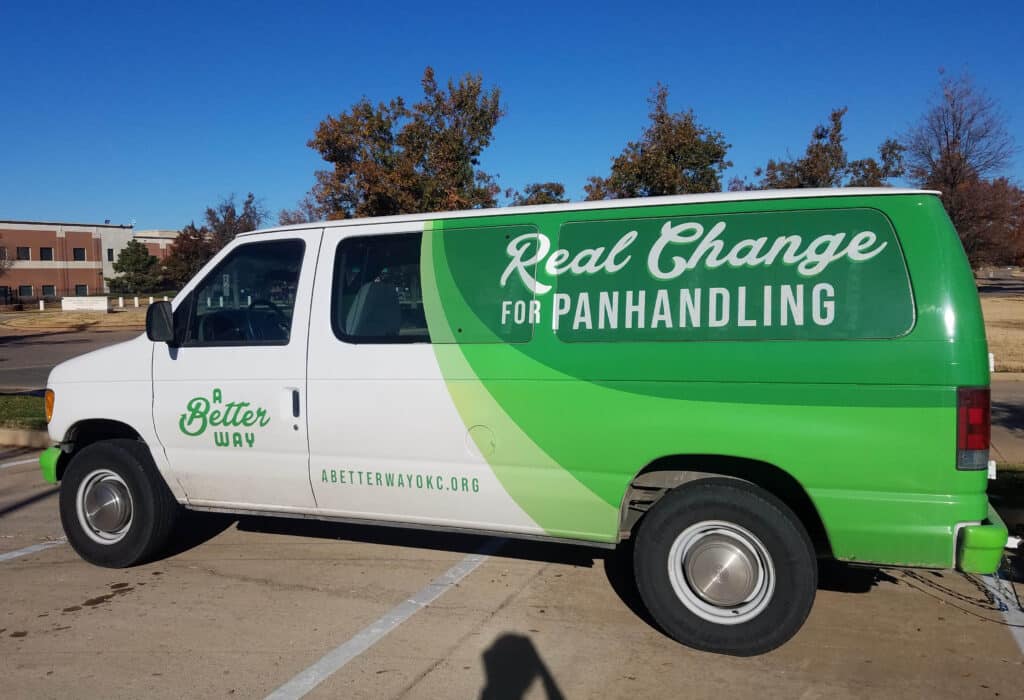
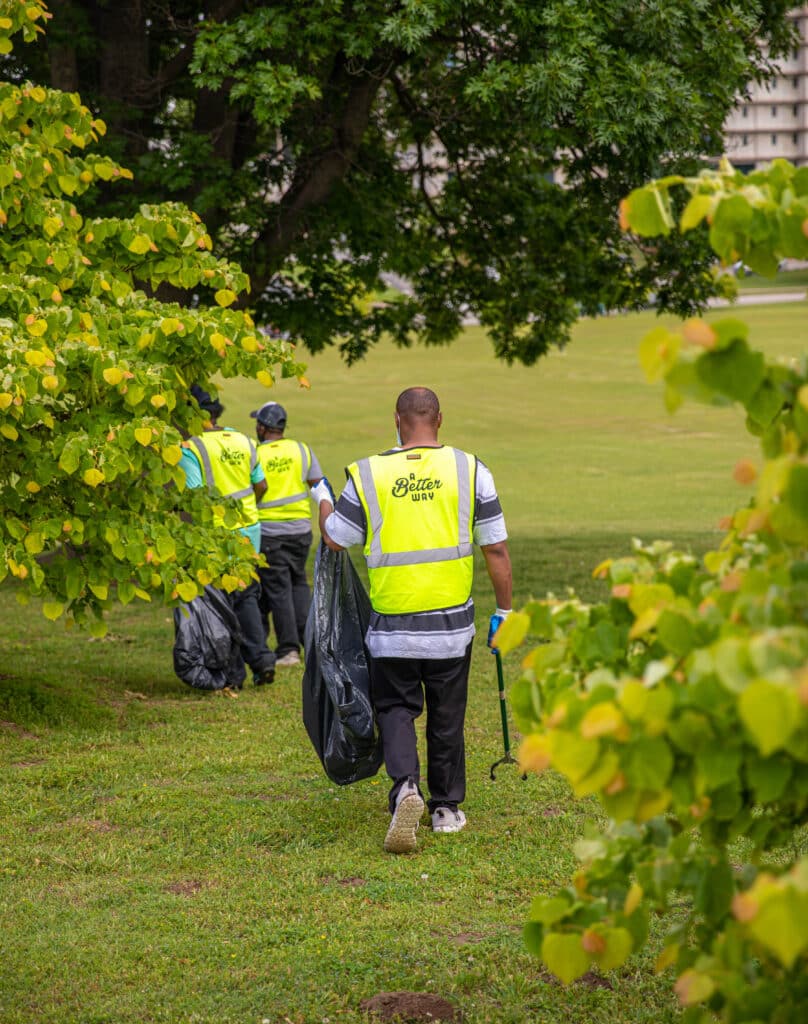
Supportive Employment
Our Supportive Employment team works to prepare individuals who suffered employment loss to return to the workforce at a livable wage. We provide personalized case management and mentorship; and we connect with local businesses, corporations and community organizations to cultivate relationships for employment opportunities. These efforts facilitate increased self-esteem, better financial security and mental health improvement.
In 2022, we served nearly 130 participants, and over 80 have found employment!
Supportive Employment
Our Supportive Employment team works to prepare individuals who suffered employment loss to return to the workforce at a livable wage. We provide personalized case management and mentorship; and we connect with local businesses, corporations and community organizations to cultivate relationships for employment opportunities. These efforts facilitate increased self-esteem, better financial security and mental health improvement.
In 2022, we served nearly 130 participants, and over 80 have found employment!
Property Maintenance
When one of our housing units is vacated and in need of repair, it has to be restored before it can be rented.
In 2022, we repaired and restored over 460 units of affordable housing.
The Eastoak Property Maintenance team successfully completed 1171 work orders and over 220 make-readies!
Property Maintenance
When one of our housing units is vacated and in need of repair, it has to be restored before it can be rented.
In 2022, we repaired and restored over 460 units of affordable housing.
The Eastoak Property Maintenance team successfully completed 1171 work orders and over 220 make-readies!

Connecting those in need with mental health resources can be daunting and requires a complex network of community resources. We work diligently to assist those struggling with mental health and homelessness on their journey to self-sustainability.
- In 2022, we had more than 1,500 calls to our Mental Health Assistance Center.
- Street Medicine served 913 individuals in 2022.
- We educated nearly 40,000 students, parents, and educators through our Youth Mental Health Program in 2022.
- In 2022, we had more than 1,500 calls to our Mental Health Assistance Center.
- Street Medicine served 913 individuals in 2022.
- We educated nearly 40,000 students, parents, and educators through our Youth Mental Health Program in 2022.
STREET MEDICINE SPOTLIGHT
MHAOK is known for its boots-on-the-ground approach to serving the most vulnerable Oklahomans. Working alongside our Street Outreach teams are our two Street Medicine teams, one in Tulsa and one in Oklahoma City. Street Medicine goes out to encampments, under bridges and places around both cities everyday to provide acute medical care for those experiencing homelessness and may be impacted by mental illness or a substance use disorder.
To watch them in action is to watch a crew of ordinary people in extraordinary roles live out their passion for serving those in need. Medical care runs the spectrum, ranging from a wound re-dressing to assistance with accessing and resuming life-saving prescription medication. Just one of many examples includes a gentleman in his early fifties who had been diagnosed with Chronic Obstructive Pulmonary Disease (COPD). Our Tulsa team took his vitals and discovered a much lower oxygen level than is considered normal. Our physician’s assistant talked with him about his medical history, and discovered that he had been without his inhaler for nearly eight months. She immediately called in a prescription at one of our partner pharmacies while the team’s case manager secured access to a primary care physician.
Stories like this are far too common, and unfortunately, these individuals are at greater risk for early death because they are less likely to seek critical medical assistance. Street Medicine is effective because it meets people where they are.
In May 2022, MHAOK purchased a Street Medicine van for our Oklahoma City team. The van brought our ability to serve to the next level, affording a clean, safe space for participants to receive treatment. It also provided a platform for deeper trust and an unexpected excitement from those in need. They are able to come inside the van and have open dialogue about their current challenges with the dignity and privacy that a doctor’s office would provide.
This was evident when one of our participants eased himself into a chair in the back and began talking about the sores on his shoulder. He is battling skin cancer while living in a shelter made only of trees and the underside of a bridge. Our street medicine nurse listened with empathy while cleaning his cancer wounds and covering them with fresh dressing; and he continues to provide that sort of survival care as we work to get him access to a primary physician, as well as off the streets and into stable housing.
This is what our Street Medicine teams do. They address the immediate needs (acute medical care) without letting them drown out the important (safe and stable housing, coupled with wraparound services to aid in self-sustainability). They are filling a gap that is both a valuable and necessary part of our commitment to continually strengthen our outreach efforts through innovative and effective solutions.
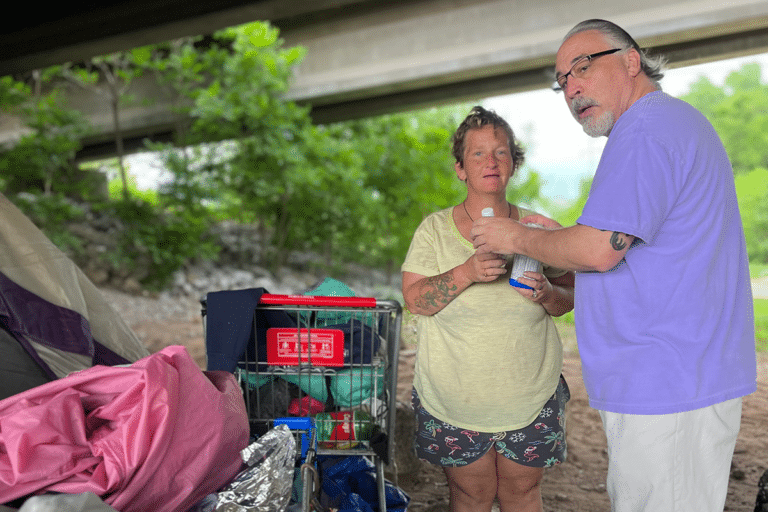
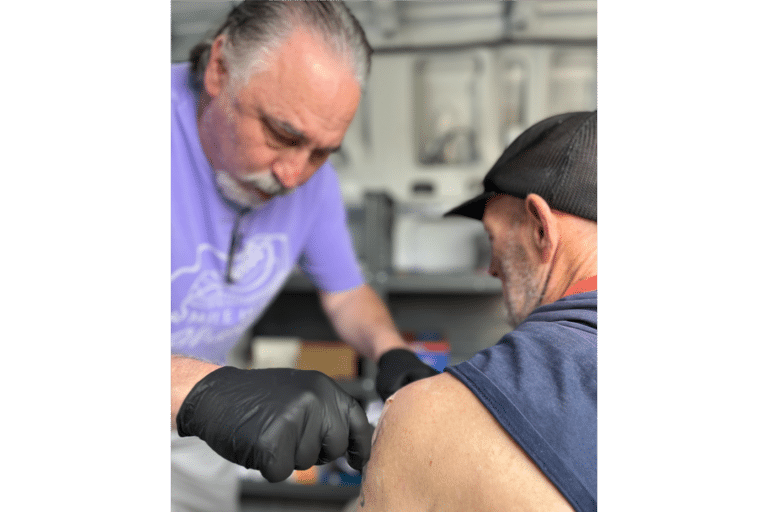
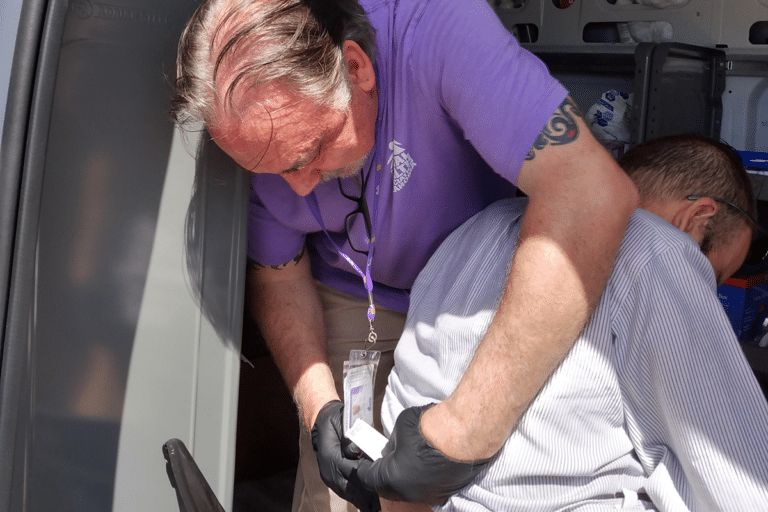
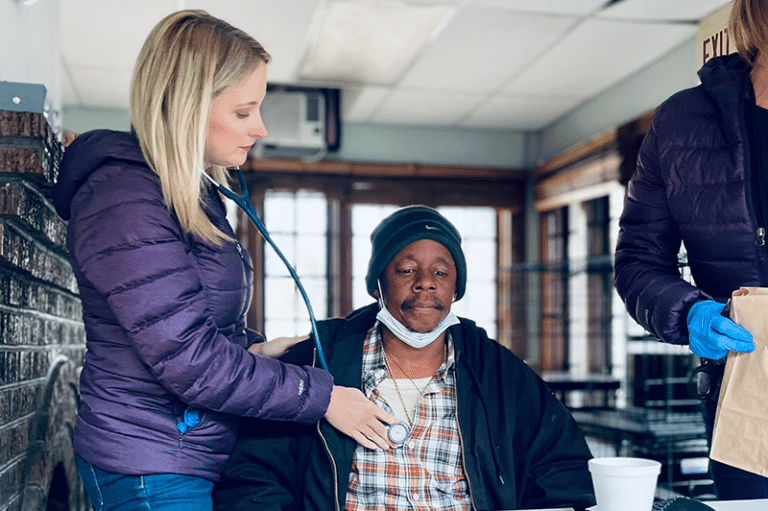
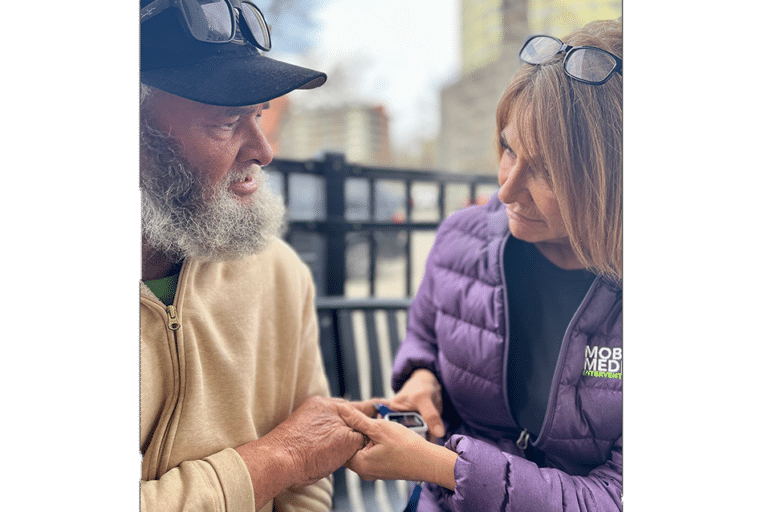
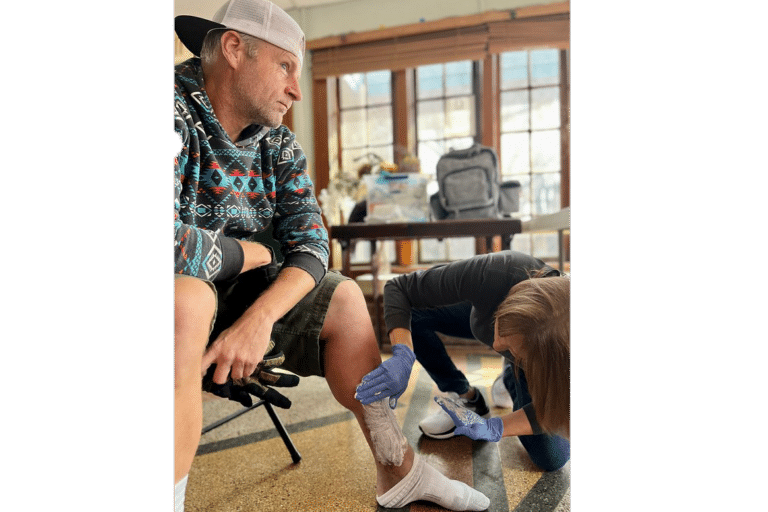
STREET MEDICINE SPOTLIGHT
MHAOK is known for its boots-on-the-ground approach to serving the most vulnerable Oklahomans. Working alongside our Street Outreach teams are our two Street Medicine teams, one in Tulsa and one in Oklahoma City. Street Medicine goes out to encampments, under bridges and places around both cities everyday to provide acute medical care for those experiencing homelessness and may be impacted by mental illness or a substance use disorder.
To watch them in action is to watch a crew of ordinary people in extraordinary roles live out their passion for serving those in need. Medical care runs the spectrum, ranging from a wound re-dressing to assistance with accessing and resuming life-saving prescription medication. Just one of many examples includes a gentleman in his early fifties who had been diagnosed with Chronic Obstructive Pulmonary Disease (COPD). Our Tulsa team took his vitals and discovered a much lower oxygen level than is considered normal. Our physician’s assistant talked with him about his medical history, and discovered that he had been without his inhaler for nearly eight months. She immediately called in a prescription at one of our partner pharmacies while the team’s case manager secured access to a primary care physician.
Stories like this are far too common, and unfortunately, these individuals are at greater risk for early death because they are less likely to seek critical medical assistance. Street Medicine is effective because it meets people where they are.
In May 2022, MHAOK purchased a Street Medicine van for our Oklahoma City team. The van brought our ability to serve to the next level, affording a clean, safe space for participants to receive treatment. It also provided a platform for deeper trust and an unexpected excitement from those in need. They are able to come inside the van and have open dialogue about their current challenges with the dignity and privacy that a doctor’s office would provide.
This was evident when one of our participants eased himself into a chair in the back and began talking about the sores on his shoulder. He is battling skin cancer while living in a shelter made only of trees and the underside of a bridge. Our street medicine nurse listened with empathy while cleaning his cancer wounds and covering them with fresh dressing; and he continues to provide that sort of survival care as we work to get him access to a primary physician, as well as off the streets and into stable housing.
This is what our Street Medicine teams do. They address the immediate needs (acute medical care) without letting them drown out the important (safe and stable housing, coupled with wraparound services to aid in self-sustainability). They are filling a gap that is both a valuable and necessary part of our commitment to continually strengthen our outreach efforts through innovative and effective solutions.
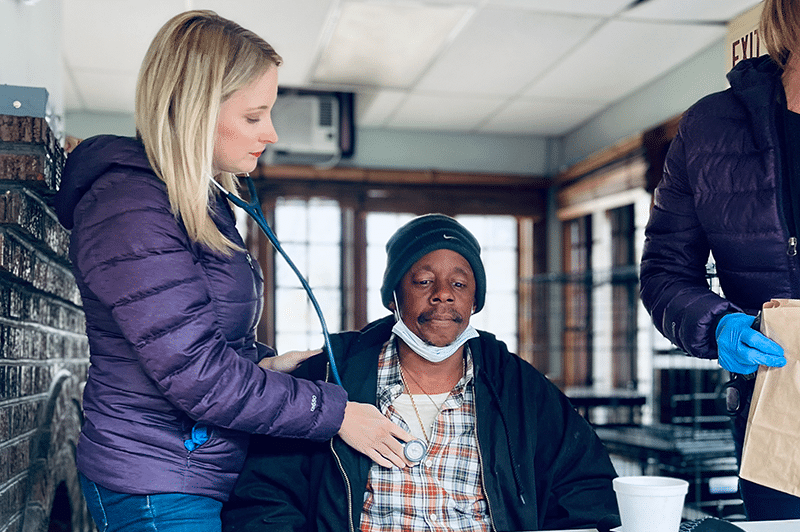
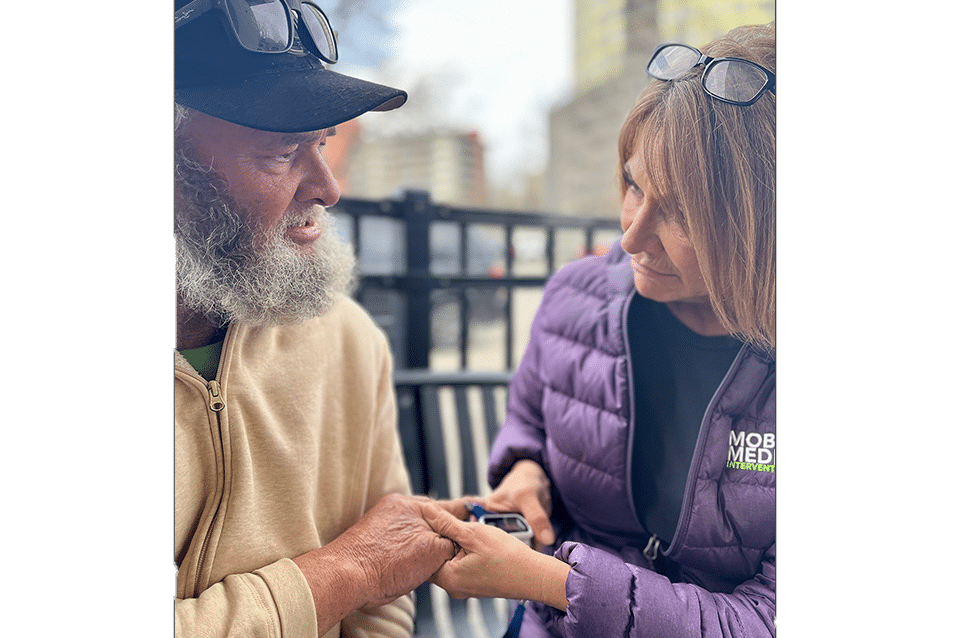
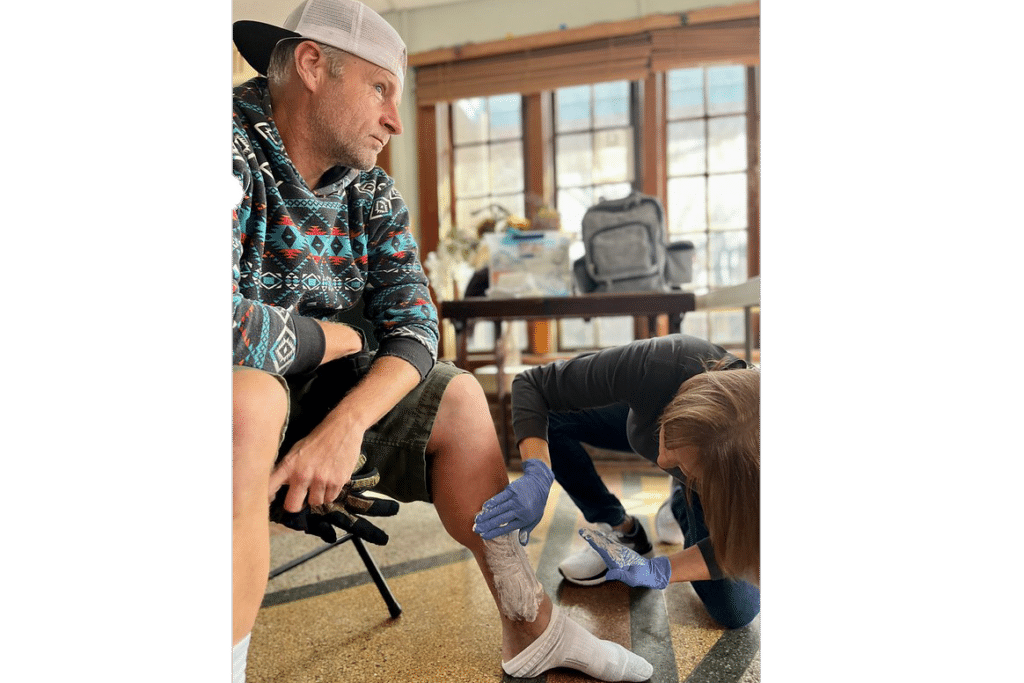
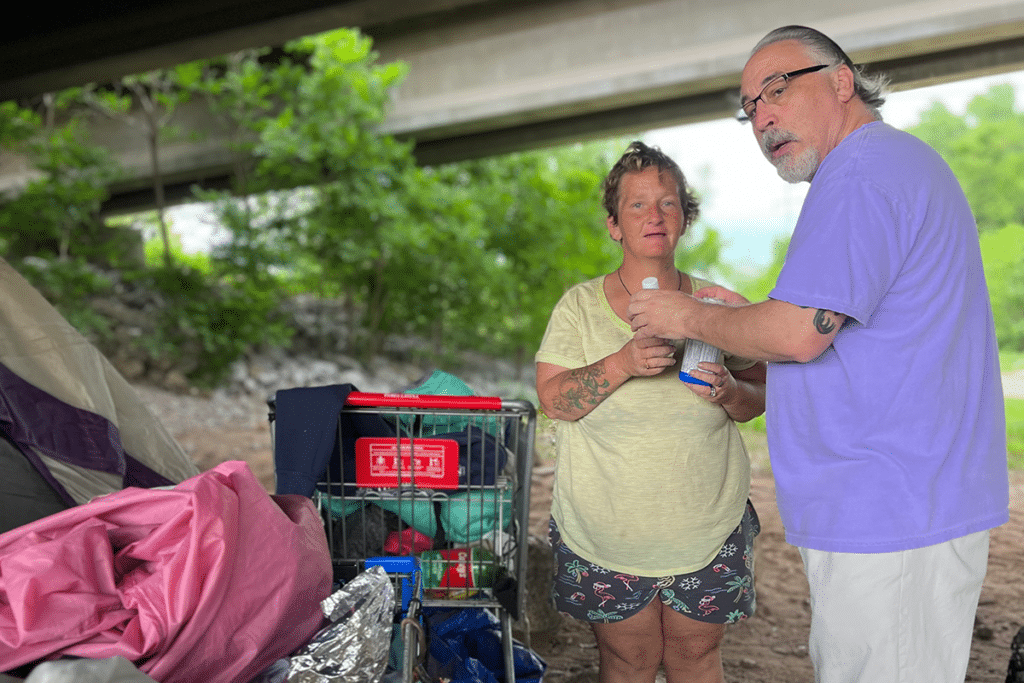
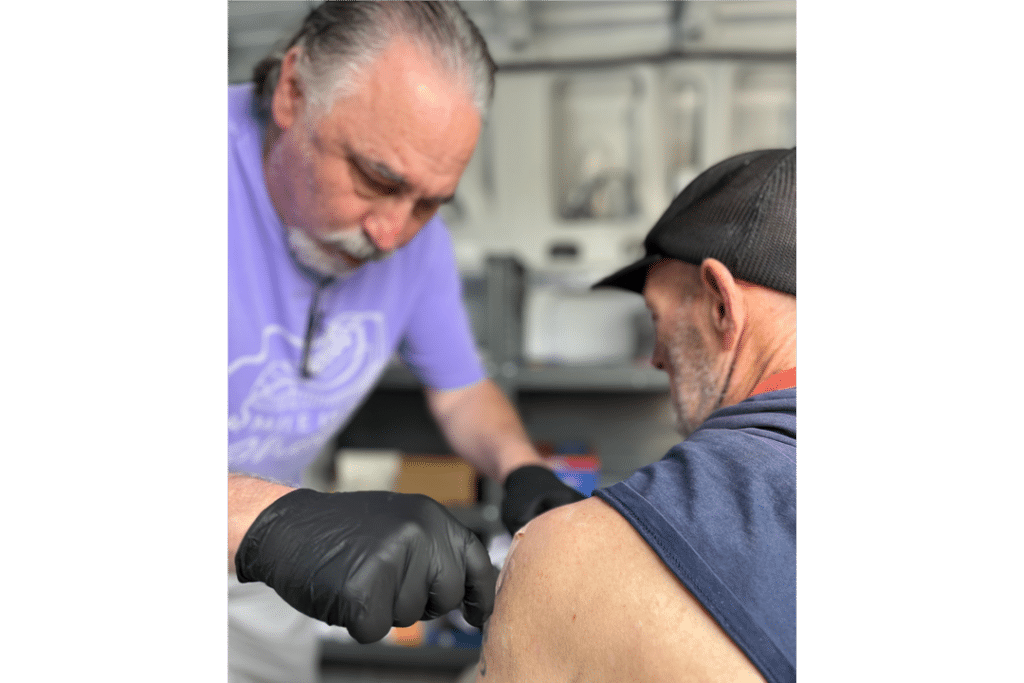
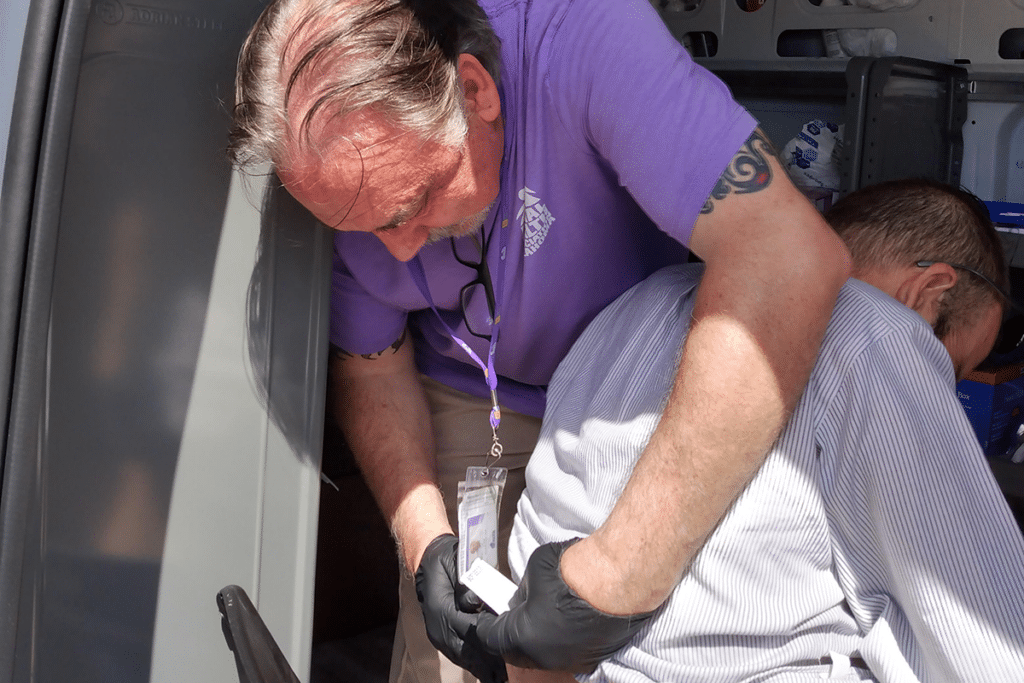
Street Medicine
Our street medicine teams in Tulsa and Oklahoma City provide in-the-field medical care for individuals experiencing homelessness, reducing over utilization of emergency rooms.
In 2022, Tulsa Street Medicine
- served 561 individuals
- saved $569,007 in ER visits
In 2022, OKC Street Medicine
- served 352 individuals
- saved $188,800 in ER visits
In 2022, Tulsa Street Medicine
- served 561 individuals
- saved $569,007 in ER visits
In 2022, OKC Street Medicine
- served 352 individuals
- saved $188,800 in ER visits
Mental Health Assistance Center
The Mental Health Assistance Center provides general mental health information, clinical consultation, screening and assistance navigating Oklahoma’s complex mental health system.
In 2022, we had more than 1,500 calls to our Mental Health Assistance Center.
SunBridge Counseling services matches individuals who are in need of counseling services but are uninsured, underinsured, or unable to afford their insurance co-pay with a therapist.
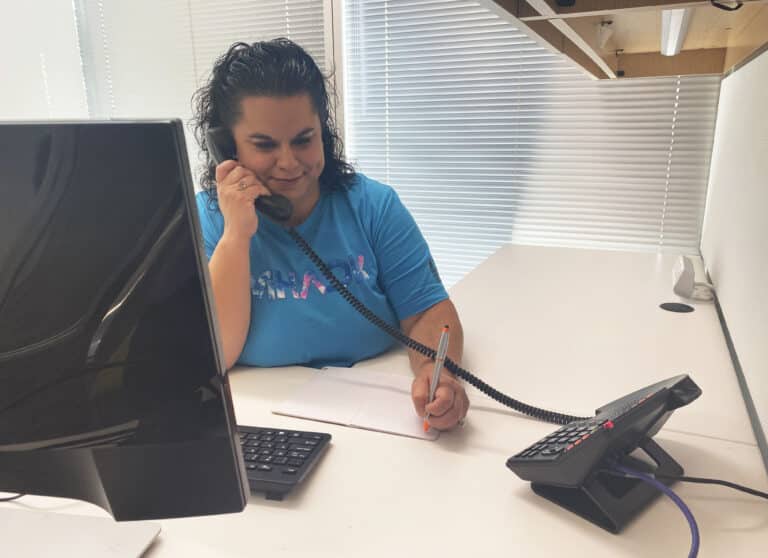
Suicide Prevention
MHAOK provides QPR (Question Persuade Refer), an evidence-based suicide prevention training for lay people that teaches them to recognize signs of suicidal ideation, respond appropriately and refer to expert resources.
In 2022, Oklahoma ranked 7th in the nation for suicide. To address this crisis, we led 26 QPR trainings, with a total of 518 participants.
Youth Mental Health
The Youth Mental Health program provides mental health education to 2nd-12th grade students in local schools. Fifth through 12th graders receive screening, triage and referral with parental consent. We promote wellness and helped prevent suicide among youth impacted by mental illness.
At a time when mental health education and services among youth is increasingly critical, we are proud to have educated nearly 30,000 students and educators in 2022.
Support Groups
In 2022 we offered 12 virtual support groups, including three bilingual groups and the addition of two new ones: BIPOC (Black, Indigenous, and People of Color) Tulsa and BIPOC OKC.
Since going virtual in 2020, we’ve grown every year.
We went from 592 zoom links sent to participants in 2021 to nearly 700 in 2022.
Platicas, our bilingual educational sessions participation rate grew by nearly 10% in 2022.
Since going virtual in 2020, we’ve grown every year.
We went from 592 zoom links sent to participants in 2021 to nearly 700 in 2022.
Platicas, our bilingual educational sessions participation rate grew by nearly 10% in 2022.
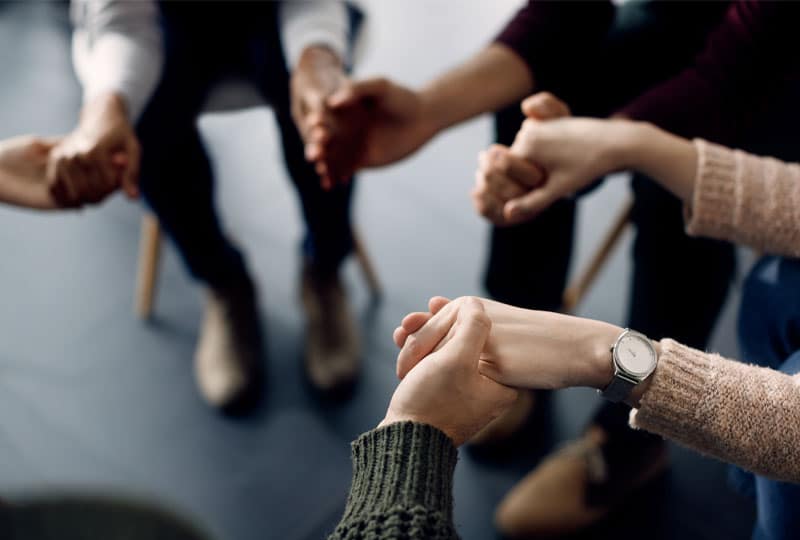

Criminal Justice Reform
This program houses the Special Services Docket initiative, which helped nearly 240 participants avoid approximately 1,600 days in jail and saved the City of Tulsa more than $372,000, compared to $300,000 in 2021.
Also included is the Bridge Program which serves Tulsans experiencing chronic homelessness with severe mental illness and/or substance use disorders who are frequent utilizers of crisis centers, jails, emergency rooms/hospitals and first response resources. Currently, 100% of the units are occupied.
Our Tulsa CARES program is a unique partnership with the Tulsa Fire Department to embed a clinical coordinator who works directly with Tulsa Fire to reach out to super-utilizers of emergency services, provide them with case management, and connect them to wrap-around services/resources to meet their needs, alleviating the burden on emergency services and improving our clients’ self-sufficiency.
Additionally, the Criminal Justice and Mental Health Training Center created and delivered 40 customized mental health and trauma-informed training to 362 criminal justice sector professionals in 2022.
Criminal Justice Reform
This program houses the Special Services Docket initiative, which helped nearly 240 participants avoid approximately 1,600 days in jail and saved the City of Tulsa more than $372,000, compared to $300,000 in 2021.
Also included is the Bridge Program which serves Tulsans experiencing chronic homelessness with severe mental illness and/or substance use disorders who are frequent utilizers of crisis centers, jails, emergency rooms/hospitals and first response resources. Currently, 100% of the units are occupied.
Our Tulsa CARES program is a unique partnership with the Tulsa Fire Department to embed a clinical coordinator who works directly with Tulsa Fire to reach out to super-utilizers of emergency services, provide them with case management, and connect them to wrap-around services/resources to meet their needs, alleviating the burden on emergency services and improving our clients’ self-sufficiency.
Additionally, the Criminal Justice and Mental Health Training Center created and delivered 40 customized mental health and trauma-informed training to 362 criminal justice sector professionals in 2022.

We could not impact the lives of more than 30,000 Oklahomans without support from our partners. As we go out each day to walk beside our clients from homelessness to housing, we carry gratitude and appreciation. Your contributions are life-changing and life-saving.
Thank you for your support. MHAOK advances mental health in our communities by connecting the most vulnerable Oklahomans with services they so desperately need.
Together we save and change lives.
RAY AND SPARKLES:
A story of Housing, Healing and Wholeness
Ray, a soft-spoken and resilient man in his early 50s, has been in and out of homelessness since he was a young child. He grew up absent a father, but lived through four different stepfathers who couldn’t fill that gap.
Volatility was common for Ray in his formative years. At fifteen years old, he ran off a third-floor balcony to escape a beating after his stepfather discovered a letter revealing Ray’s homosexuality – an incident that landed him in the foster care system.
Determined to have a different life, Ray worked diligently, ultimately becoming a successful business owner only to have to sell. His brother was in crisis and needed the money. Ray was in his early forties when he entered the construction industry and earned the credentials needed for a supervisory role. He was relatively new in the position when, on a stroll through downtown, he passed out. It was the beginning of a life-threatening heart issue, although he didn’t know it yet.
He lost his opportunity. Quickly running out of money, medically unable to work, and without insurance Ray, once again, found himself living outside – surviving, really, and barely that. He ping ponged from the streets to a local shelter until his brother was able to take him in, but that was short-lived.
Once again, Ray had no place to call home. It was late summer, 2018.
Another year goes by, and the heart syncope is worsening. In August 2019, Ray suffered a cardiac event that landed him in the hospital. There, he has shelter, access to medical care, and a nurse who not only tends to him, but bonds with Sparkles, Ray’s rescue chihuahua who also rescued Ray.
In October 2019, Ray and Sparkles, reunited, were discharged back to the streets of Oklahoma City. Ray was close to giving up. His suicidal ideation was intensifying, and just as he was making arrangements to have Sparkles cared for, his nurse connected him with an advocate at the Day Center.
His advocate understood the direness of Ray’s situation and quickly referred him to Mental Health Association Oklahoma for housing through the city’s Coordinated Entry System. MHAOK began the intake process immediately, and in just a few weeks, Ray and Sparkles were unlocking the door to their new home.
Through wraparound services, Ray was connected with a primary care provider to manage his physical recovery and to mental health services so he has assistance managing his depression and suicidal ideation. His MHAOK case manager has also helped him secure necessary dental surgery, and continues to provide grocery and prescription deliveries.
This journey can be a bumpy one. In early 2022, Ray was hospitalized for suicidal ideation, but with support from MHAOK, he was able to return home. The team is continuing to guide him through the social security and disability application processes as he works toward self-sustainability.
Today, Ray and Sparkles remain stably housed. They are continuing to heal. They are no longer experiencing homelessness, but wholeness instead.
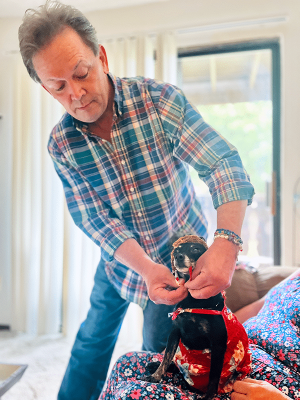
RAY AND SPARKLES:
A story of Housing, Healing and Wholeness
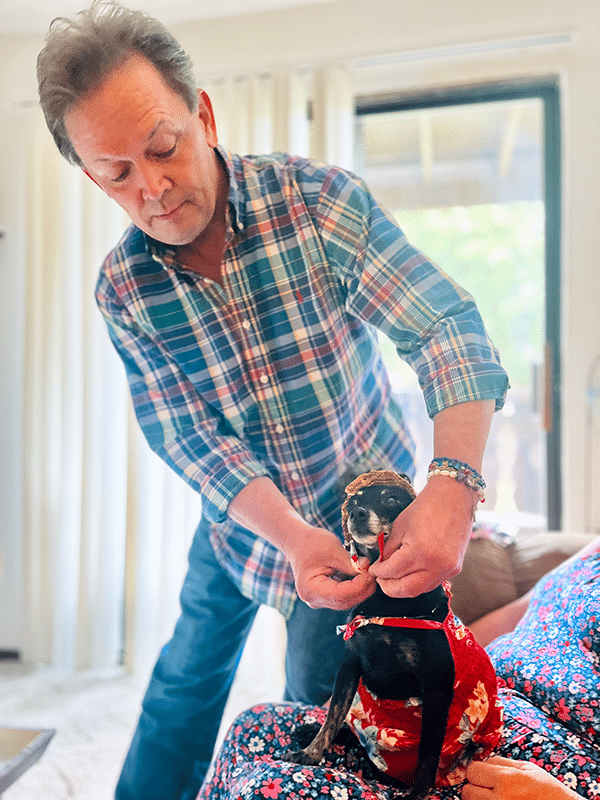
Ray, a soft-spoken and resilient man in his early 50s, has been in and out of homelessness since he was a young child. He grew up absent a father, but lived through four different stepfathers who couldn’t fill that gap.
Volatility was common for Ray in his formative years. At fifteen years old, he ran off a third-floor balcony to escape a beating after his stepfather discovered a letter revealing Ray’s homosexuality – an incident that landed him in the foster care system.
Determined to have a different life, Ray worked diligently, ultimately becoming a successful business owner only to have to sell. His brother was in crisis and needed the money. Ray was in his early forties when he entered the construction industry and earned the credentials needed for a supervisory role. He was relatively new in the position when, on a stroll through downtown, he passed out. It was the beginning of a life-threatening heart issue, although he didn’t know it yet.
He lost his opportunity. Quickly running out of money, medically unable to work, and without insurance Ray, once again, found himself living outside – surviving, really, and barely that. He ping ponged from the streets to a local shelter until his brother was able to take him in, but that was short-lived.
Once again, Ray had no place to call home. It was late summer, 2018.
Another year goes by, and the heart syncope is worsening. In August 2019, Ray suffered a cardiac event that landed him in the hospital. There, he has shelter, access to medical care, and a nurse who not only tends to him, but bonds with Sparkles, Ray’s rescue chihuahua who also rescued Ray.
In October 2019, Ray and Sparkles, reunited, were discharged back to the streets of Oklahoma City. Ray was close to giving up. His suicidal ideation was intensifying, and just as he was making arrangements to have Sparkles cared for, his nurse connected him with an advocate at the Day Center.
His advocate understood the direness of Ray’s situation and quickly referred him to Mental Health Association Oklahoma for housing through the city’s Coordinated Entry System. MHAOK began the intake process immediately, and in just a few weeks, Ray and Sparkles were unlocking the door to their new home.
Through wraparound services, Ray was connected with a primary care provider to manage his physical recovery and to mental health services so he has assistance managing his depression and suicidal ideation. His MHAOK case manager has also helped him secure necessary dental surgery, and continues to provide grocery and prescription deliveries.
This journey can be a bumpy one. In early 2022, Ray was hospitalized for suicidal ideation, but with support from MHAOK, he was able to return home. The team is continuing to guide him through the social security and disability application processes as he works toward self-sustainability.
Today, Ray and Sparkles remain stably housed. They are continuing to heal. They are no longer experiencing homelessness, but wholeness instead.
AND THERE'S MORE...
Finance and Development
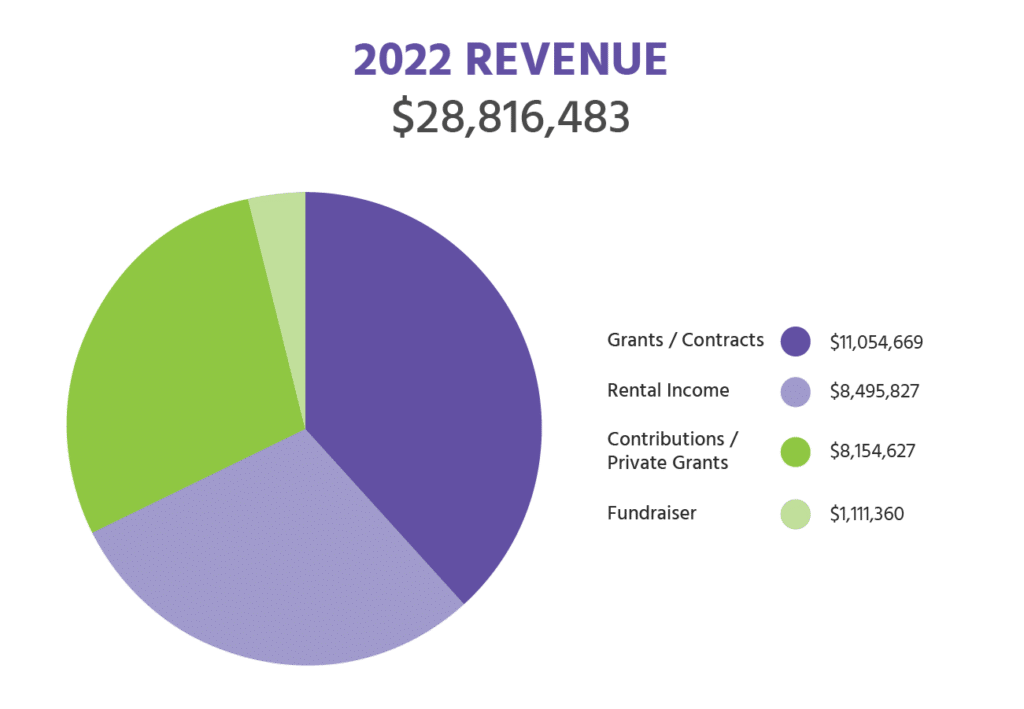
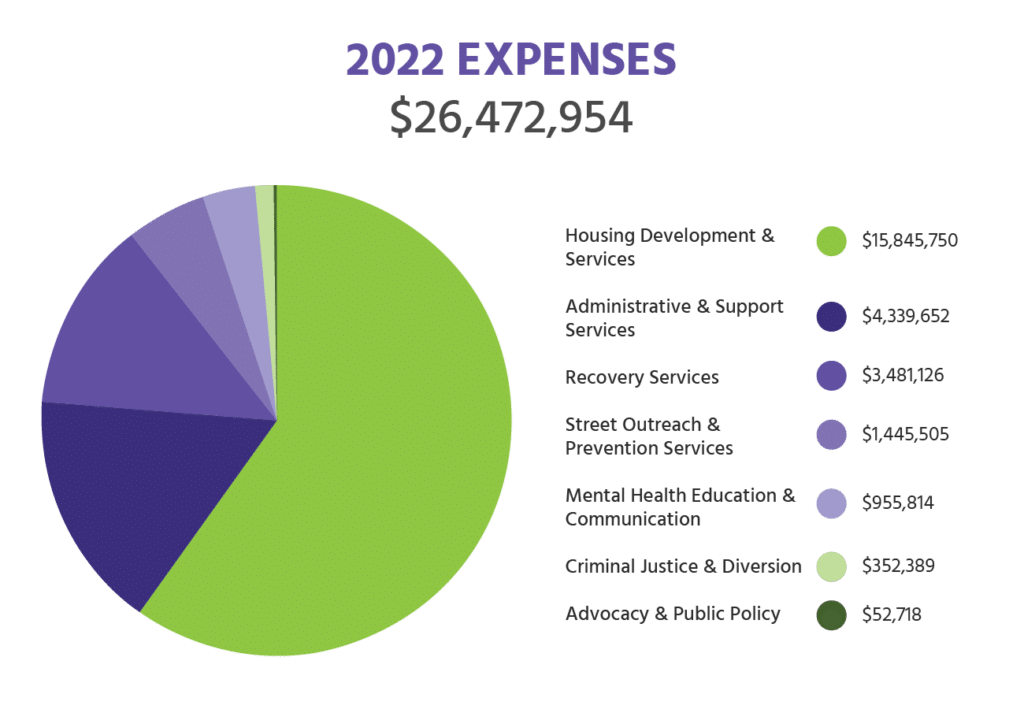
In 2022, Carnivale, also known as The Best Party in Town, raised a whopping $1,111,360.
Our Development Department’s dedication paid off in grant money from foundations and private donations totaling $3,155,140.
Zarrow Symposium sponsorship raised $109,750.
Finance and Development


In 2022, Carnivale, also known as The Best Party in Town, raised a whopping $1,111,360.
Our Development Department’s dedication paid off in grant money from foundations and private donations totaling $3,155,140.
Zarrow Symposium sponsorship raised $109,750.
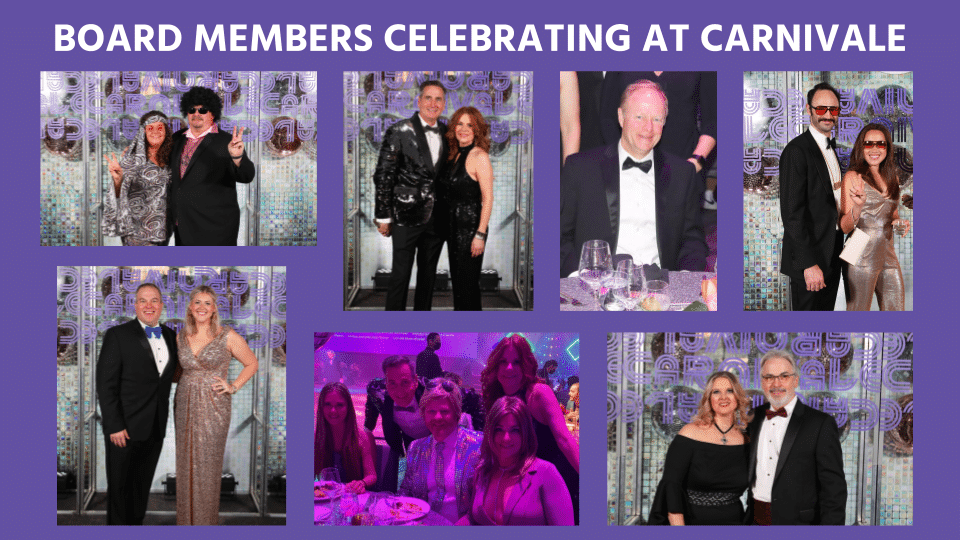

Zarrow Symposium
This year, we Explored Family Constructs at the Zarrow Symposium, which showcased four keynote speakers and 98 additional speakers contributing to 52 breakout sessions.
Attendance increased to 814 participants from 8 different states and 2 different countries.
Several of this year’s speakers made guest appearances on the Mental Health Download, leading to 971 podcast listeners tuning in to hear more from our Zarrow Symposium professionals.
Zarrow Symposium
This year, we Explored Family Constructs at the Zarrow Symposium, which showcased four keynote speakers and 98 additional speakers contributing to 52 breakout sessions.
Attendance increased to 814 participants from 8 different states and 2 different countries.
Several of this year’s speakers made guest appearances on the Mental Health Download, leading to 971 podcast listeners tuning in to hear more from our Zarrow Symposium professionals.
Council on Accreditation
We are proud to celebrate the re-accreditation of our COA status!
Not only were we re-accredited, but we achieved our goal of earning only top ratings of 1 and 2 in all categories. This takes consistent effort from every MHAOK employee, and we showed excellence across the board.
Council on Accreditation
We are proud to celebrate the re-accreditation of our COA status!
Not only were we re-accredited, but we achieved our goal of earning only top ratings of 1 and 2 in all categories. This takes consistent effort from every MHAOK employee, and we showed excellence across the board.
Communications and Marketing
Our Communications and Marketing Department was busy building brand awareness, in 2022, with the Eastoak Properties website launch and the MHAOK website total redesign. Notable additions to these efforts were the new online merchandise store and the blog, both of which went live this fall.
Mental Health Download Podcast had nearly 7,500 downloads, and the MHAOK was featured in over 50 news stories.
Our social media following grew 19%.
Communications and Marketing
Our Communications and Marketing Department was busy building brand awareness, in 2022, with the Eastoak Properties website launch and the MHAOK website total redesign. Notable additions to these efforts were the new online merchandise store and the blog, both of which went live this fall.
Mental Health Download Podcast had nearly 7,500 downloads, and the MHAOK was featured in over 50 news stories.
Our social media following grew 19%.
Out and About
Out and About
Contact Us
We’re here to help. Reach out to connect with mental health resources, housing support, or information about our services.

